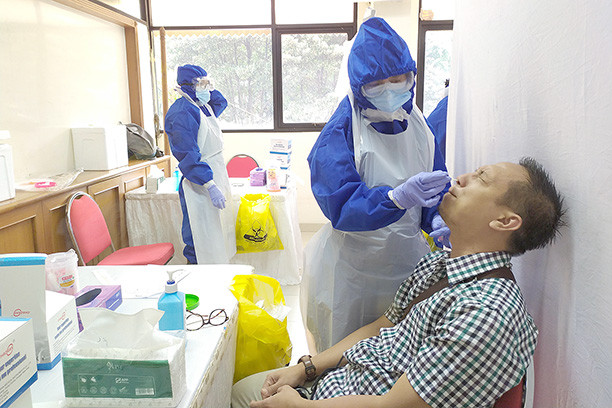Popular Reads
Top Results
Can't find what you're looking for?
View all search resultsPopular Reads
Top Results
Can't find what you're looking for?
View all search resultsGovt seeks to curb virus with targeted testing, tracing
Targeted testing and tracing form a large part of the government’s efforts to slow down the spread of the virus.
Change text size
Gift Premium Articles
to Anyone
I
t has been seven months since President Joko “Jokowi” Widodo announced the first confirmed COVID-19 cases in Indonesia. Since then, the number of cases has continued to rise.
“We are currently preparing for COVID-19 vaccines. Hopefully, we can receive them in November,” said Coordinating Maritime Affairs and Investment Minister Luhut Binsar Pandjaitan in a virtual meeting on Tuesday.
Luhut warned of the possibility of a spike in COVID-19 cases at the end of this month, saying that the government needed to prepare for it.
While hoping for the approval of a COVID-19 vaccine, targeted testing and tracing form a large part of the government’s efforts to slow down the spread of the virus.
Monica Nirmala, advisor to Indonesia’s COVID-19 management team, said the virus was often transmitted by only a handful of infected people, known as super spreaders, noting that 80 percent of new cases were caused by 20 percent of infected people.
She added that once the virus was transmitted, infected people would develop symptoms between two and 10 days. In this short infectious period, timing and quick responses were keys to stopping transmission.
The Jakarta, West Java and Bali administrations shared during the meeting that they had performed several targeted testing and tracing efforts.
Jakarta Governor Anies Baswedan said that in the preceding 14 days, the capital had seen a decrease in office infection clusters after conducting targeted testing and tracing.
Read also: Minister Luhut wants stricter health protocols in place during ‘critical time’
Anies said the Jakarta administration was providing free testing for up to 8,000 samples daily and that community health centers (puskemas) in district areas served as the front lines for the effort.
He said each puskesmas had two divisions, namely digital tracing and field coordinating, that worked to trace close contacts of COVID-19 patients, both virtually and directly.
In addition to the puskemas initiative, the Jakarta administration has prepared a mobile application called Jakarta Terkini (JAKI), which has 800,000 active users. The application reports health protocols and traces COVID-19 patients.
Bali Governor I Wayan Koster said the island had seen a decrease in daily cases.
“New COVID-19 cases are now below 100 per day. Meanwhile, the number of recovered patients has increased to 86.37 percent. We can also manage death cases to below five percent,” he said.
I Wayan stressed the importance of healthcare services, both medical workers and facilities, and coordination with the military command (Kodam) and the regional police in disseminating the “3M” health protocols: mask-wearing, hand-washing and physical distancing.
West Java governor Ridwan Kamil said the province had been using QR Code check-ins for visitors to government offices for tracing purposes.
The three governors have sought to improve testing and tracing efforts by applying three strategies, namely controlling stigma, increasing the number and skills of tracing staff and improving the management of tracing reports. Lessening the stigma of the virus is among the priorities as many people are afraid to undergo polymerase chain reaction (PCR) tests because they fear the stigma of the virus.
In addition to testing, tracing and isolation, Monica also stressed the importance of early detection and patient accompaniment from isolation until treatment to manage the pandemic. (jes)
Editor’s note: This article is part of a public campaign by the COVID-19 task force to raise people’s awareness about the pandemic.










